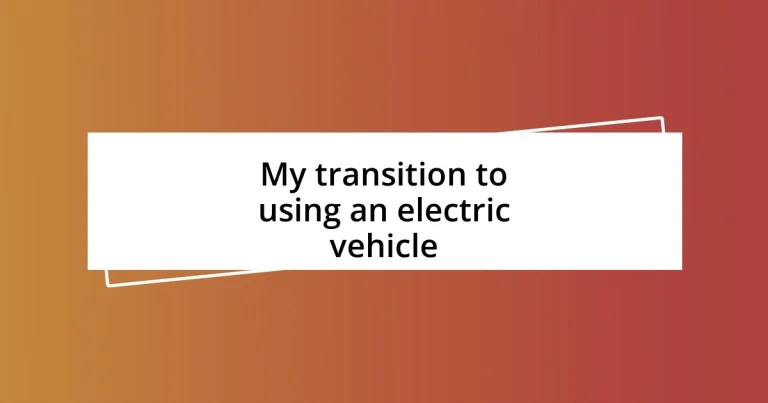Key takeaways:
- Electric vehicles (EVs) offer significant cost savings, positive environmental impact, and a unique driving experience compared to traditional cars.
- Choosing the right EV involves careful consideration of factors like range, charging options, cost, space, and brand reputation.
- Maintaining an EV is straightforward, focusing on battery health and software updates, while sharing experiences can foster community support among EV owners.
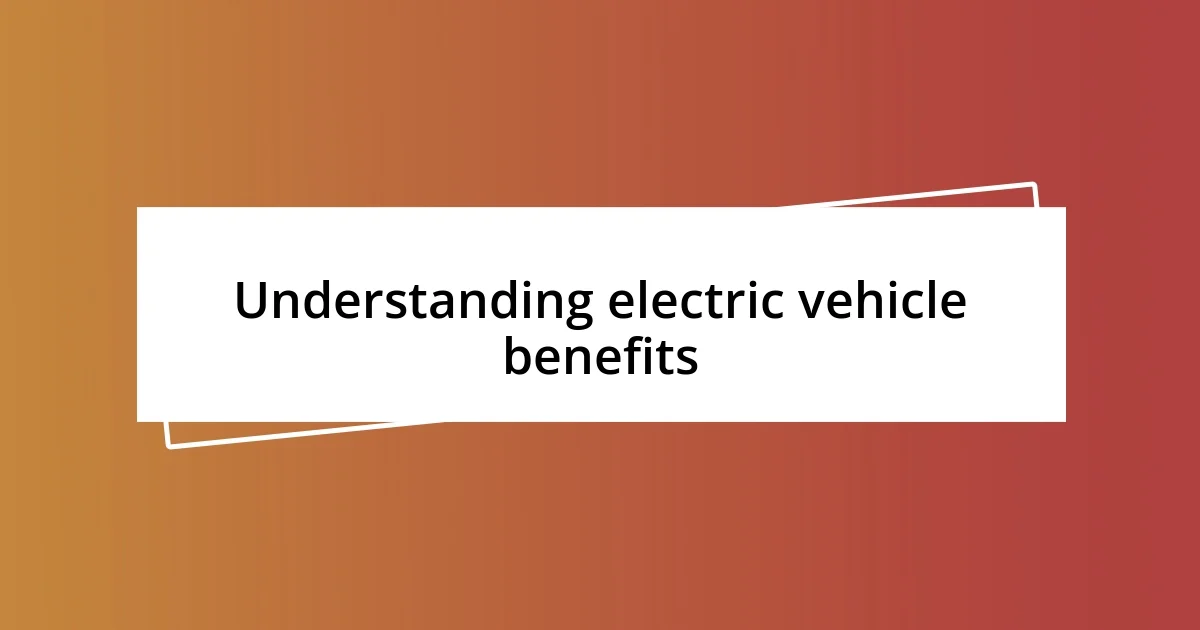
Understanding electric vehicle benefits
One of the most compelling benefits of electric vehicles (EVs) is the cost savings over time. I remember feeling a sense of relief when I realized that I could cut down on fuel expenses significantly. Have you ever calculated how much you spend on gas? The savings from charging an EV at home can really add up, especially if you consider fluctuating gas prices.
Moreover, the environmental impact of transitioning to an EV struck a chord with me. I’ve always been concerned about climate change, and driving an electric vehicle made me feel like I was contributing positively. It’s exhilarating to think that my daily commute is powered by renewable energy—how often do we get the chance to align our values with our choices?
Additionally, the driving experience with an electric vehicle is quite different from traditional cars. I was pleasantly surprised by the instant torque when I first drove my EV; it felt like gliding rather than just driving. Did you know that many people find the quietness of EVs almost meditative? This serenity on the road has completely reshaped my driving habits.
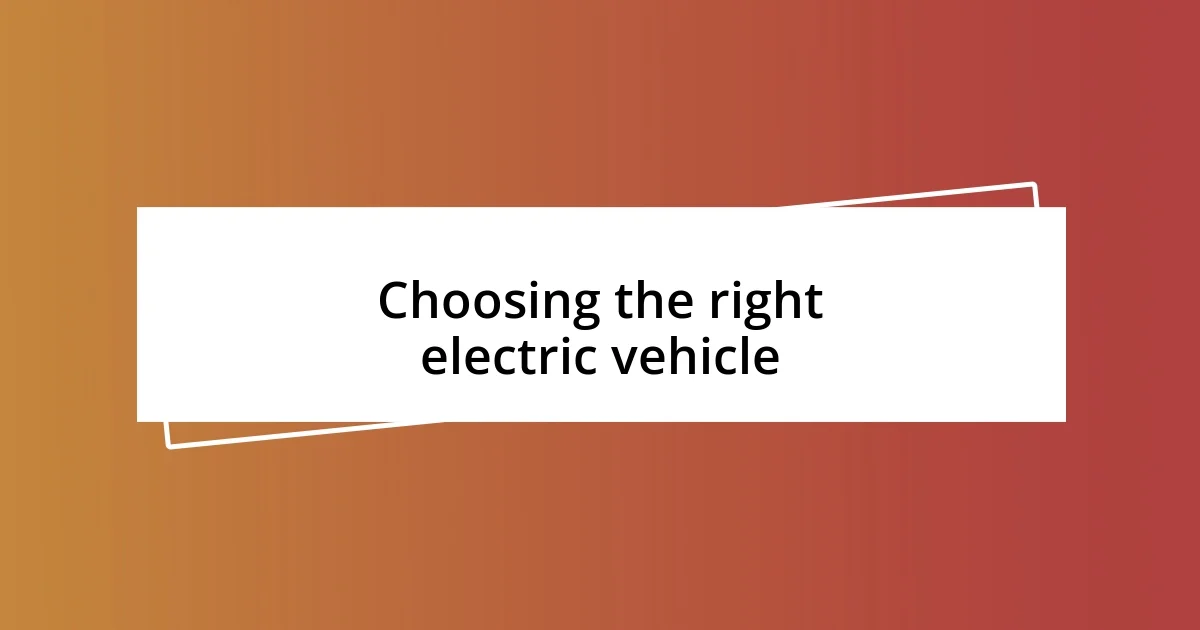
Choosing the right electric vehicle
Choosing the right electric vehicle can feel overwhelming, but I found it helpful to focus on what truly mattered to me. For instance, my lifestyle and driving habits played a significant role in my decision. When considering options, I asked myself questions like: How far do I typically drive in a day? What kind of features do I value most, like a large touchscreen or advanced safety technology? These reflections guided me towards a model that matched my needs flawlessly.
When I finally narrowed down my choices, I created a checklist to evaluate the contenders. Here’s what I considered:
- Range: How many miles can the vehicle go on a single charge?
- Charging Options: What are the charging speeds and availability of charging stations?
- Cost: What’s my budget, and are there incentives or rebates available?
- Space: Does it have enough room for my family and cargo?
- Brand Reputation: How reliable is the manufacturer in terms of performance and service?
Taking these factors into account made me feel more confident in my decision-making process. After all, choosing an electric vehicle is as much about practicality as it is about excitement for the greener future ahead.
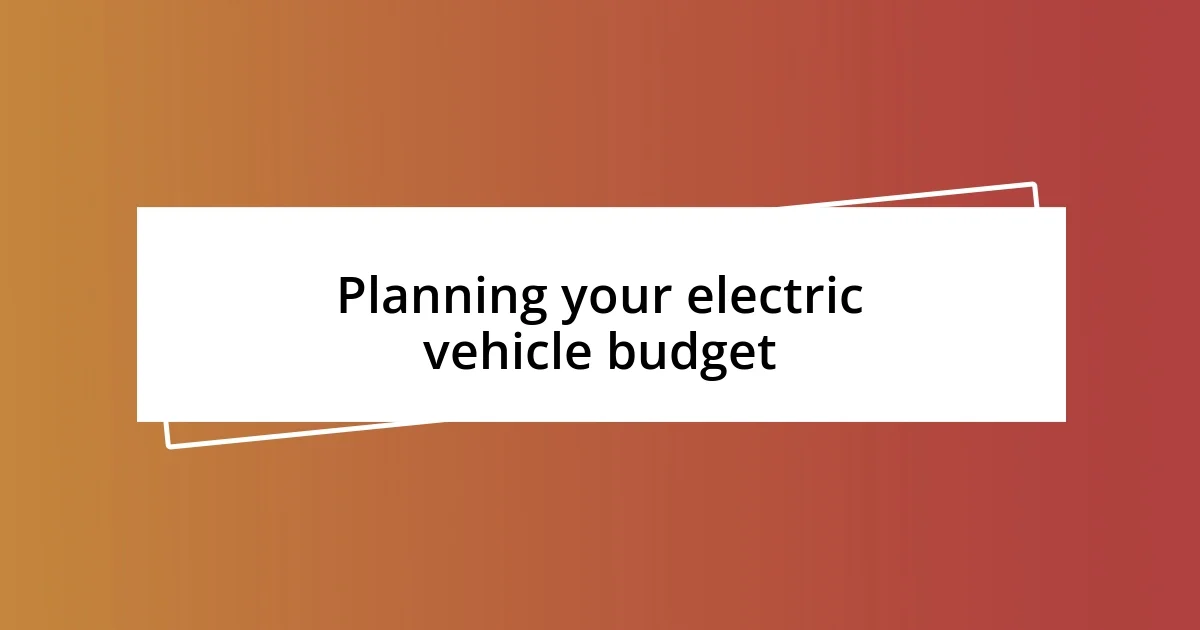
Planning your electric vehicle budget
The transition to an electric vehicle (EV) not only requires consideration of the purchase price but also careful planning for ongoing expenses. I immediately recognized that electricity costs, maintenance, insurance, and potential charging expenses would play significant roles in my EV budget. For instance, while my EV’s upfront cost felt like a big commitment, I quickly learned that homeowners can save a fortune by charging overnight—something my neighbor, who also transitioned to an EV, can attest to. Have you ever analyzed the difference in monthly overhead between a gasoline car and an electric one?
Another aspect I had to consider was the available incentives. Many states offer tax credits and rebates for EV purchases, which can help offset the initial costs. I remember checking and discovering that I qualified for a generous incentive that trimmed thousands off my purchase price. It felt like an unexpected gift when I saw that line item! Additionally, some electric utility companies provide discounts for off-peak charging, which can further enhance your budget.
To aid my understanding of expenses, I created a comparison of costs between traditional combustion vehicles and my electric vehicle.
| Expense Type | Traditional Vehicle | Electric Vehicle |
|---|---|---|
| Fuel/Charging Costs | $150/month | $50/month |
| Maintenance | $100/month | $40/month |
| Insurance | $120/month | $100/month |
| Incentives | $0 | $5,000 |
In summary, planning an EV budget involves a holistic view of all related expenses, from initial costs and incentives to ongoing charges and maintenance. Each piece of the puzzle contributes to a clearer financial picture, ultimately leading to a more informed decision in your electric vehicle journey.
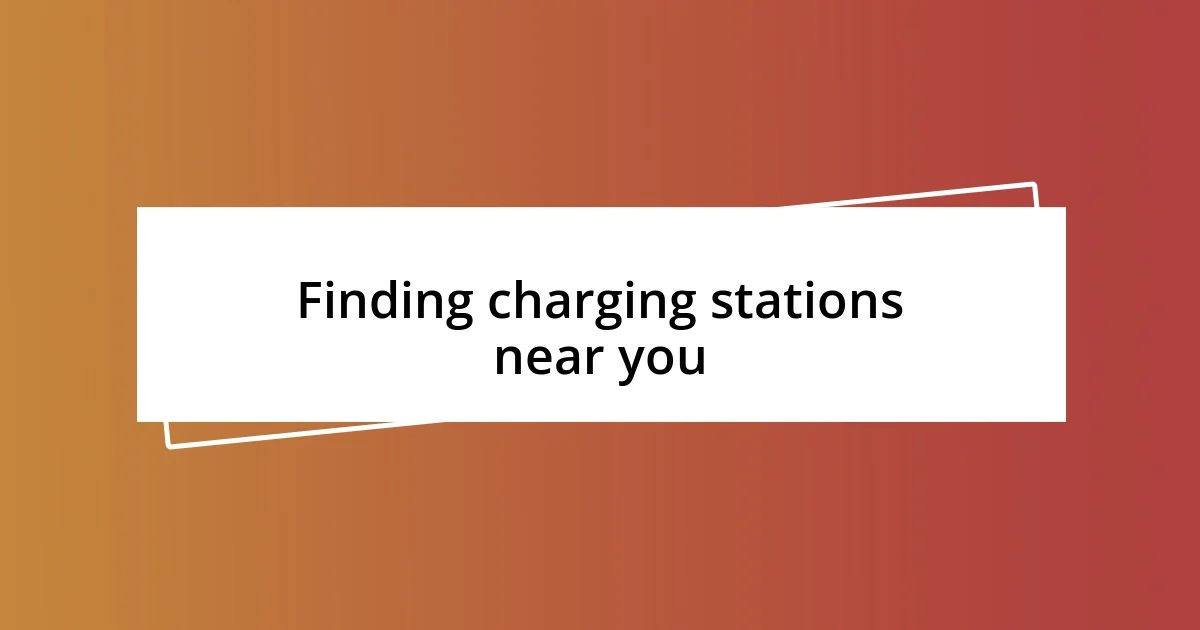
Finding charging stations near you
Finding charging stations was one of my initial concerns after committing to an electric vehicle. Thankfully, I discovered several handy resources that made this process easier than I imagined. For example, using apps like PlugShare and ChargePoint quickly turned into daily essentials for me. They not only pinpoint nearby stations but also provide real-time availability updates—those little green lights felt like a beacon of hope during my early days of driving electric.
I remember one particular road trip where I heavily relied on my charging app. As I was cruising along, I noticed my battery level dropping a little faster than expected. I pulled up the app, and it showed a charging station about ten minutes away. Honestly, I was relieved! The experience reinforced how essential it is to know where charging stations are located, especially when venturing beyond familiar territory. It’s funny how something as simple as planning a charging stop can turn into a mini-adventure.
Moreover, it’s important to consider the type of charging stations available as they can vary significantly. Level 2 chargers, for example, are great for longer stops, while DC fast chargers can reduce your waiting time significantly. I learned firsthand the value of planning my route according to the charging station types, especially when I took that trip through a less populated area. It made me realize that every charge is not just a necessity, but an opportunity to explore new places, stretch my legs, and, occasionally, treat myself to a delicious cup of coffee while I waited!

Adjusting your driving habits
Adjusting to driving an electric vehicle meant changing a few habits that I had unconsciously built over the years. One significant shift was my approach to acceleration and braking. At first, I found myself pressing the pedal with the same enthusiasm I used in my gasoline car. But once I experienced the instant torque of my EV, I realized there’s something satisfying about easing off the pedal and letting the regenerative braking do its magic. Have you ever felt that rush when you realize the vehicle is helping you save energy just by the way you drive? It brings a fresh perspective to the experience.
Another habit I had to adjust was my perception of distance. With a gas tank, I often felt carefree about range, but switching to electric made me more mindful. Early on, I planned my trips around charging points, and it felt almost like a puzzle. I remember feeling a sense of accomplishment the first time I completed a longer journey without running low on battery. It was a lesson in not just where I was going, but how I got there. Wouldn’t you say that being more intentional with your routes can transform the driving experience?
I also discovered that my daily driving pattern changed in ways I hadn’t anticipated. I began taking shorter trips just to enjoy the smooth and quiet ride of my EV, no longer feeling the burden of fuel costs weighing on me. The thrill of gliding through the city without a care about gas expense was liberating! Do you think these subtle shifts can enhance your overall driving satisfaction? For me, they certainly did, turning what used to feel routine into a new kind of adventure.
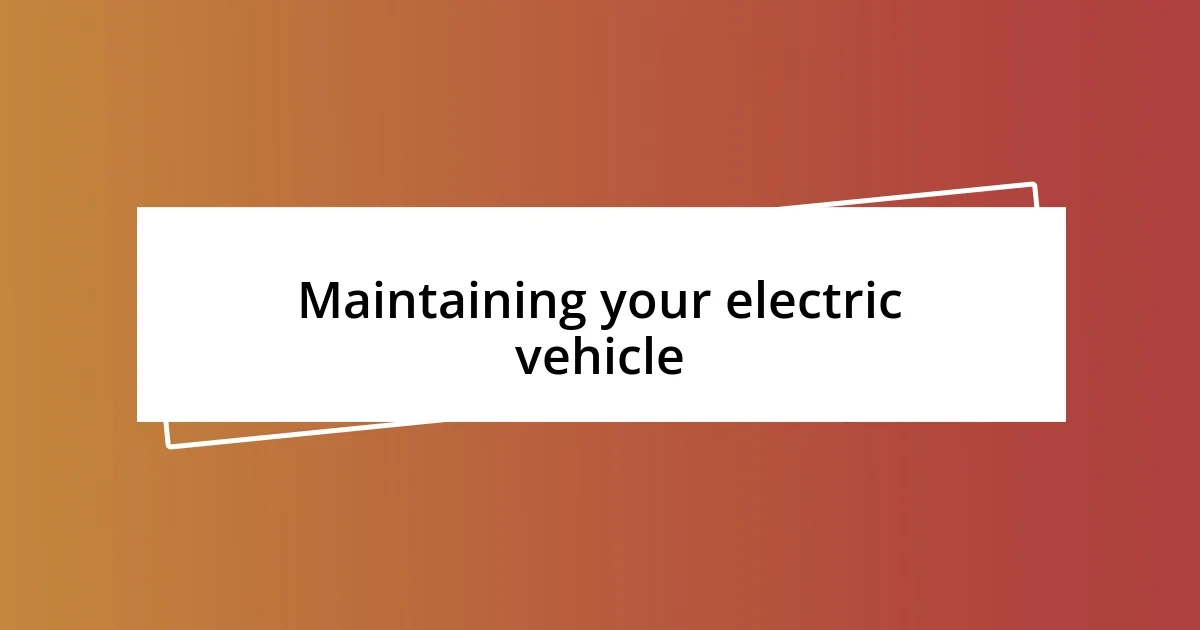
Maintaining your electric vehicle
Maintaining an electric vehicle is surprisingly straightforward, but I’ve learned that it requires a different mindset than traditional cars. For instance, the absence of engine oil changes is a breath of fresh air! However, I now pay close attention to my battery health and tire pressure regularly. I feel it’s essential to keep my EV performing at its best, so I’ve developed a habit of checking these details before embarking on any longer journey. Don’t you find that these small acts of preventative maintenance can significantly extend the life of your vehicle?
I also discovered that software updates can play a crucial role in maintaining an electric vehicle. Early on, I was a bit skeptical, but after a couple of updates, I noticed improvements in my car’s range and even its infotainment system’s performance. It’s fascinating how technology keeps evolving! Taking a bit of time to review these updates not only enhances my driving experience but also reassures me that I’m getting the most out of my electric vehicle. Have you ever experienced something similar with technology?
Another aspect that I genuinely enjoy is the simplicity of keeping my EV clean and well-maintained. Washing the exterior is quick, and I’ve even started a routine of cleaning the interior regularly. The lack of exhaust means I don’t deal with those unpleasant fumes that usually come after a gas station visit. Plus, I get a kick out of knowing that a little care goes a long way in maintaining that like-new feel. Doesn’t it feel rewarding to keep your vehicle looking fresh, reflecting the commitment you’ve made to a sustainable choice?

Sharing your electric vehicle experience
Sharing my electric vehicle experience has become an important part of my journey. When I first started, I felt a bit hesitant about discussing my switch to electric with friends and family. But as I shared my excitement about the quiet nudge of acceleration and the smooth, almost serene ride, their interest piqued. Have you ever found that sharing your new passion helps solidify your commitment to it? For me, it felt like I was spreading the word about not just a car, but a lifestyle change.
I remember a particular conversation with a coworker who was considering buying an electric vehicle. I enthusiastically recounted my first road trip, where I strategically planned stops at charging stations. I described how connecting with fellow EV owners at those stations created a sense of community that I had never felt with gas vehicles. It made me realize how sharing experiences can build a network of support and encouragement. Isn’t it powerful how stories can inspire others to take the leap, too?
Recently, I joined an online forum dedicated to electric vehicle enthusiasts. The exchange of tips, from finding the best charging apps to discovering beautiful scenic routes for road trips, has been incredibly enriching. Each shared experience adds another layer of confidence and excitement to my daily driving. It’s a reminder that we’re not just consumers; we’re part of a growing movement towards sustainable living. Does it resonate with you when you find a community that shares your values? It’s truly empowering.












